Supporting students from disadvantaged backgrounds

Universities must deliver on plans to improve access and participation for disadvantaged students and put an end to the high rates of students dropping out of courses, the Education Secretary has said today (26 September).
Rt Hon Gavin Williamson CBE MP Department for Education Sanctuary Buildings
Great Smith Street London
SW1P 3BT
26 September 2019
Dear Gavin,
I am writing in response to your letter dated 25 September 2019 regarding universities supporting students from disadvantaged backgrounds.
It is welcome that your letter addressed the significant progress made in this area. Recent data has shown that the university entry rate of 18-year-olds from disadvantaged backgrounds in England is at record levels. The gap between students from the most and least disadvantaged backgrounds getting into university has also narrowed. Since 2013-14, UK-domiciled BAME student numbers in England have increased by 17%, while the proportion of students across the UK who disclosed as disabled has more than doubled since 2003/04.
However, there is more to be done to speed up progress – which is why universities are continuing to set ambitious targets to accelerate progress over the next five years through their Access and Participation Plans. These plans set out challenging targets to reduce the access gap between the most and least disadvantaged in society, reduce the attainment gap between white and BAME students, and more. For example, Aston University has set a target to eliminate its BAME attainment gap by 2025. My university, Brunel is focusing on supporting disabled students and care leavers, with an increased attention on mature students when it comes to access and retention.
Further, Universities UK is working closely with our members on access and participation through:
- Raising school pupil attainment – identifying best practice on how universities can work with schools to raise pupil attainment and increase access to university for those from disadvantaged backgrounds
- Leading a review of admissions practices – including how practices like contextual offers can go further in widening access
- Improving outcomes for BAME students – implementing a framework to reduce the attainment gap that exists between white and BAME students
- Developing support for care leavers – advising universities on how to develop their support offer for care leavers, working collaboratively with the DfE as part of the Care Leaver Covenant
- Improving support for disabled students – supporting the transition to the Disabled Students Commission, which will identify and promote approaches that improve models of support for disabled students
While universities are doing more in this area, continued progress will need the support of government and I call on you to commit to the following:
- Reintroduce maintenance grants for those who need them. The switch from maintenance grants to loans had a more significant impact on students from disadvantaged backgrounds who need to take out higher loans to cover living costs, resulting in higher lifetime loan repayments.
- Increase funding for the Centre for Transforming Access and Student Outcomes (TASO) to achieve a step change in understanding of what works. We welcomed the setup of TASO following UUK’s recommendation back in 2016 that we need a what works centre in higher education. A well-funded what works centre has the potential to support a transformative effect in educational outcomes (as seen in the Education Endowment Foundation for schools).
- Commit to funding collaborative opportunities for schools, colleges, universities and other parties to improve access beyond the next couple of years. For example, collaboration with business is needed to enable disadvantaged students to get paid internships and work placements. We know that these experiences significantly impact upon degree outcomes, entering a graduate level job within 6 months of graduation and the starting salary. At my own institution, Brunel, the salary premium is around £4,000.
- Supporting and championing Foundation Years. Foundation Years provide a crucial stepping-stone into universities for individuals with high potential but non-traditional entry qualifications. We want to see government champion the vital role that they play especially for those from disadvantaged backgrounds. Our analysis shows that in England in 2017/18, 86% of foundation year students from the most disadvantaged backgrounds progressed to degree study. Many students on such courses entered strategically important courses such as engineering, physics and biological science.
- Better support for the expansion of degree apprenticeships. Degree apprenticeships are rapidly increasing, while the range of apprenticeships on offer is broadening. However, progress could be faster, and I urge you to address our recommendations to overcome these challenges outlined in our recent report “The Future of Degree Apprenticeships”.
- Widening the data on disadvantage that universities can access. It is important that universities have access to a wide range of indicators of disadvantage to properly measure and track access and other activities, and to ensure that measures of disadvantage are not used in isolation.
It is a personal priority of mine as President of Universities UK to ensure everyone has an equal chance of accessing and thriving at university. This will take the commitment of not just universities, but schools, employers, government and others. I am keen to bring such parties together to meet with you to discuss how we all work together to maximise progress in this area. I hope you will be open to this discussion with stakeholders at your earliest convenience.
Yours sincerely,











Responses